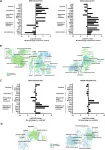Journal in Which the Study was Published: Cancer Epidemiology, Biomarkers & Prevention, a journal of the American Association for Cancer Research
Author: Motolani Ogunsanya, PhD, an assistant professor at The University of Oklahoma Health Sciences Center
Background: Palliative care aims to improve the quality of life for patients and caretakers by addressing the physical, psychological, and logistical challenges associated with a disease or its treatment. In contrast to hospice, which provides comfort care for patients who have stopped treatment and are near the end of life, palliative care serves as an adjunct to life-sustaining treatments by addressing the side effects of treatment or symptoms of the disease.
"Despite the known benefits of palliative care and its endorsement by the American Society of Clinical Oncology and the National Comprehensive Cancer Network, we have not seen an increased uptake of palliative care by those who need it most," said Ogunsanya. "A common misconception is that palliative care is only for end-of-life care when, in fact, it can begin at any point in the disease course."
How the Study was Conducted: To study the extent of people's knowledge about palliative care and understand how various factors impact knowledge of palliative care across the American population, Ogunsanya and colleagues analyzed data from a National Cancer Institute's Health Information National Trends Survey (HINTS) from 2018. The dataset included self-reported demographic and clinical information, such as sex, age, education level, current health status, cancer history, and frequency of health care utilization, among others. Respondents self-reported their knowledge of palliative care by selecting between: "I've never heard of it," "I know a little bit about palliative care," and "I know what palliative care is, and I could explain it to someone else." The first two responses were grouped together as inadequate knowledge, and the final response was considered adequate knowledge.
Results: Among the 3,450 survey respondents, approximately 65 percent identified as non-Hispanic white, at least 90 percent had health insurance, about 60 percent had utilized the health care system more than twice in the past year, and about 10 percent had been previously diagnosed with cancer.
Overall, only 11 percent of the respondents reported adequate knowledge of palliative care. Women and married individuals were twice as likely to have adequate knowledge when compared with men and single respondents, respectively. Those who had a college degree were over 13-times more likely to have adequate knowledge of palliative care compared with respondents without a high school degree.
Health care utilization was also associated with knowledge of palliative care, as those with a regular source of medical care were 2.67 times more likely to have adequate knowledge of palliative care than those without regular medical care. In addition, respondents with a prior cancer diagnosis were 51 percent more likely to have adequate knowledge of palliative care than those who had never been diagnosed with cancer. Ogunsanya noted that this might be due to the increased engagement patients with cancer have with the health care system.
Author's Comments: "We found that in addition to personal factors, such as education level or marital status, the frequency of health care utilization had a significant impact on an individual's understanding of palliative care," said Ogunsanya. "This is a novel finding for the palliative care field and provides important insight into how we might be able to improve knowledge of this service.
"Since health care providers are often the first and most trusted source of health care information, educating physicians on palliative care and encouraging them to discuss it with their patients and caretakers is one potential strategy to increase understanding of palliative care," Ogunsanya noted. She added that addressing additional barriers to palliative care, such as misconceptions and lack of resources or time, are also important approaches to increasing awareness.
Study Limitations: A limitation of the study was that knowledge of palliative care was self-reported; however, Ogunsanya noted that this mode of data collection also provided an important perspective. "How someone perceives their own knowledge of palliative care may reveal more about their likelihood to pursue palliative care than a more objective measure," she explained. "If someone is not confident in their knowledge of palliative care, they may be less inclined to ask for it, regardless of how well they do understand it."
Additional limitations of the study included the exclusion of individuals who did not speak English or Spanish and those without a permanent address.
INFORMATION:
Funding & Disclosures: This research was supported by The University of Oklahoma Health Sciences Center. Ogunsanya declares no conflicts of interest.
About the American Association for Cancer Research
Founded in 1907, the American Association for Cancer Research (AACR) is the world's first and largest professional organization dedicated to advancing cancer research and its mission to prevent and cure cancer. AACR membership includes 48,000?laboratory, translational, and clinical researchers; population scientists; other health care professionals; and patient advocates residing in 127 countries. The AACR marshals the full spectrum of expertise of the cancer community to accelerate progress in the prevention, diagnosis, and treatment of cancer by annually convening more than 30 conferences and educational workshops--the largest of which is the AACR Annual Meeting, with more than 74,000 attendees for the 2020 virtual meetings and more than 22,500 attendees for past in-person meetings. In addition, the AACR publishes nine prestigious, peer-reviewed scientific journals and a magazine for cancer survivors, patients, and their caregivers. The AACR funds meritorious research directly as well as in cooperation with numerous cancer organizations. As the Scientific Partner of Stand Up To Cancer, the AACR provides expert peer review, grants administration, and scientific oversight of team science and individual investigator grants in cancer research that have the potential for near-term patient benefit. The AACR actively communicates with legislators and other policymakers about the value of cancer research and related biomedical science in saving lives from cancer. For more information about the AACR, visit http://www.AACR.org.



